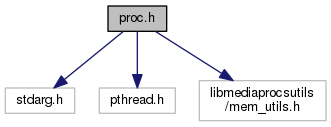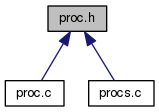Generic processor (PROC) module.
More...
#include <stdarg.h>
#include <pthread.h>
#include <libmediaprocsutils/mem_utils.h>
Go to the source code of this file.
|
| enum | proc_io_t { PROC_IPUT = 0,
PROC_OPUT = 1,
PROC_IO_NUM = 2
} |
| |
|
| proc_ctx_t * | proc_open (const proc_if_t *proc_if, const char *settings_str, int proc_instance_index, uint32_t fifo_ctx_maxsize[PROC_IO_NUM], log_ctx_t *log_ctx, va_list arg) |
| |
| void | proc_close (proc_ctx_t **ref_proc_ctx) |
| |
| int | proc_send_frame (proc_ctx_t *proc_ctx, const proc_frame_ctx_t *proc_frame_ctx) |
| |
| int | proc_recv_frame (proc_ctx_t *proc_ctx, proc_frame_ctx_t **ref_proc_frame_ctx) |
| |
| int | proc_opt (proc_ctx_t *proc_ctx, const char *tag,...) |
| |
| int | proc_vopt (proc_ctx_t *proc_ctx, const char *tag, va_list arg) |
| |
|
int | proc_send_frame_default1 (proc_ctx_t *proc_ctx, const proc_frame_ctx_t *proc_frame_ctx) |
| |
|
int | proc_recv_frame_default1 (proc_ctx_t *proc_ctx, proc_frame_ctx_t **ref_proc_frame_ctx) |
| |
|
void | proc_stats_register_accumulated_latency (proc_ctx_t *proc_ctx, const int64_t oput_frame_pts) |
| |
Generic processor (PROC) module.
- Author
- Rafael Antoniello
A typical application would use a generic processor as follows:
1) Application prologue: Open the processor using function 'proc_open()' and obtain its context structure (or handler). Opening the processor is performed only once at the beginning of the application. Function 'proc_open()' will internally initialize and launch necessary processing threads.
2) Application cyclic: Launch a producer thread and a consumer thread for processing data. Use a control thread to manage processor run-time options. The producer should use 'proc_send_frame()' function to put new frames of data into the processor's input FIFO buffer. The consumer should use 'proc_recv_frame()' to obtain processed frames from the processor's output FIFO buffer. The control thread may use the function 'proc_opt()' to manage processor options.
3) Application epilogue: Close the processor using the function 'proc_close()'. Function 'proc_close()' internally joins the processing threads and release all related resources.
Concurrency: The processor (PROC) module is thread-safe, thus run-time functions can be executed concurrently (at the exception of 'proc_open()' and 'proc_close()' functions).
Definition in file proc.h.
| #define CJSON_PRINT |
( |
|
CJSON_PTR | ) |
cJSON_Print(CJSON_PTR) |
cJSON to character string conversion function definition. String can be formated or minimized (removing whitespace, carriage return, ...).
Definition at line 70 of file proc.h.
| #define IPUT_PTS_ARRAY_SIZE 128 |
Array registering the last input presentation time-stamps (PTS's). Each PTS is registered together with the system-time clock (STC) corresponding to the registration instant.
Definition at line 131 of file proc.h.
Generic processor (PROC) context structure.
PROC interface structure prototype. Each PROC type will define a static and unambiguous interface of this type.
Definition at line 58 of file proc.h.
Processor input-output type enumerator.
Definition at line 76 of file proc.h.
Ends processing thread, de-initialize and release the generic processor (PROC) context structure and all the related resources.
- Parameters
-
| ref_proc_ctx | Reference to the pointer to the processor (PROC) context structure to be release, that was obtained in a previous call to the 'proc_open()' function. Pointer is set to NULL on return. |
Definition at line 208 of file proc.c.
| proc_ctx_t* proc_open |
( |
const proc_if_t * |
proc_if, |
|
|
const char * |
settings_str, |
|
|
int |
proc_instance_index, |
|
|
uint32_t |
fifo_ctx_maxsize[PROC_IO_NUM], |
|
|
log_ctx_t * |
log_ctx, |
|
|
va_list |
arg |
|
) |
| |
Allocates generic processor (PROC) context structure, initializes, and launches processing thread.
- Parameters
-
| proc_if | Pointer to the processor interface structure (static and unambiguous interface of the type of processor we are opening). |
| settings_str | Character string containing initial settings for the processor. String format can be either a query-string or JSON. |
| proc_instance_index | Each PROC instance is registered in an instance array with a specific index (managed and assigned from outside this module). The idea behind using an array is to fetch as fast as possible the PROC instance to perform i/o operations. |
| fifo_ctx_maxsize | Maximum size, in number of queued elements, for the input and output FIFOs of the processor. |
| log_ctx | Pointer to the LOG module context structure. |
| arg | Variable list of parameters defined by user. |
- Returns
- Pointer to the generic processor context structure on success, NULL if fails.
Definition at line 87 of file proc.c.
| int proc_opt |
( |
proc_ctx_t * |
proc_ctx, |
|
|
const char * |
tag, |
|
|
|
... |
|
) |
| |
Processor options. This function is thread-safe and can be called concurrently.
- Parameters
-
| proc_ctx | Pointer to the processor (PROC) context structure obtained in a previous call to the 'proc_open()' function. |
| tag | Processor option tag, namely, option identifier string. The following options are available:
- PROC_UNBLOCK
- PROC_GET
- PROC_PUT
|
| ... | Variable list of parameters according to selected option. Refer to Tags description below to see the different additional parameters corresponding to each option tag. |
- Returns
- Status code (STAT_SUCCESS code in case of success, for other code values please refer to .stat_codes.h).
Tags description (additional variable arguments per tag)
-
Tag "PROC_UNBLOCK":
Unblock processor input/output FIFO buffers.
No additional variable arguments are needed for calling function proc_opt() with this tag.
Tag "PROC_GET":
Get processor representational state (including current settings).
Additional variable arguments for function proc_opt() are:
- Parameters
-
| rest_fmt | Indicates the format in which the response data is to be returned. Available formats are enumerated at 'proc_if_rest_fmt_t'. |
| ref_reponse | Reference to the pointer to a data structure returning the processor's representational state. The returned data structure is formatted according to what is indicated in the parameter 'rest_fmt'. |
Tag "PROC_PUT":
Put (pass) new settings to processor.
Additional variable arguments for function proc_opt() are:
- Parameters
-
| str | Pointer to a character string containing new settings for the processor. String format can be either a query-string or JSON. |
Definition at line 368 of file proc.c.
Get new processed frame of data from the processor's output buffer. Unless unblocked (see processor options 'proc_opt()'), this function blocks until a new frame is available to be read from the processor's output buffer. This function is thread-safe and can be called concurrently.
- Parameters
-
| proc_ctx | Pointer to the processor (PROC) context structure obtained in a previous call to the 'proc_open()' function. |
| ref_proc_frame_ctx | Reference to the pointer to a structure characterizing the output processed frame. This function will return the processed frame passing its structure pointer by argument. |
- Returns
- Status code (STAT_SUCCESS code in case of success, for other code values please refer to .stat_codes.h).
Definition at line 323 of file proc.c.
Put new frame of data to be processed in the processor's input buffer. Unless unblocked (see processor options 'proc_opt()'), this function blocks until a slot is available to be able to push the new frame into the processor's input buffer. This function is thread-safe and can be called concurrently.
- Parameters
-
| proc_ctx | Pointer to the processor (PROC) context structure obtained in a previous call to the 'proc_open()' function. |
| proc_frame_ctx | Pointer to the structure characterizing the input frame to be processed. The frame is duplicated and inserted in the input buffer. |
- Returns
- Status code (STAT_SUCCESS code in case of success, for other code values please refer to .stat_codes.h).
Definition at line 287 of file proc.c.
| int proc_vopt |
( |
proc_ctx_t * |
proc_ctx, |
|
|
const char * |
tag, |
|
|
va_list |
arg |
|
) |
| |
The function 'proc_vopt()' is the same as proc_opt() except that it is called with a va_list instead of a variable number of arguments. This function does not call the va_end macro. Because it invoke the va_arg macro, the value of the argument pointer is undefined after the call.
Definition at line 382 of file proc.c.


 1.8.11
1.8.11